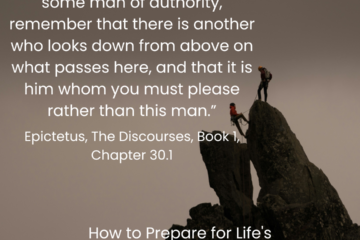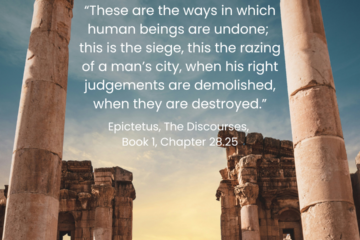The Discourses of Epictetus, Book 1, Chapter 20: On How Reason Is Able to Contemplate Itself.
As you can see the title of this post: ‘How Can Reason Contemplate Itself’ and the title of the discourse itself don’t differ too much. This discourse is a bit shorter and it’s focused on this topic, but there is a lot to explore. It’s an examination of reason, something similar to what we saw in chapter 1 of this book. There’s a post in the blog based on that chapter titled: What is Our Reasoning Faculty?
Since the concept of reason is a fundamental topic in Stoicism, I’m thankful to Arrian for dedicating another chapter to this. It must have seemed important to him as well to address it again in the same book. Yet here Arrian focuses more on the fact that the reasoning faculty deals with impressions. Besides that, he gives some criticism of Epicurus as well. Highlighting the rivalry between the two philosophical schools.
Reason contemplates what
“Whenever, therefore, it is of like kind with the objects of its contemplation, it necessarily contemplates itself too.”
Epictetus, The Discourses, Book 1, Chapter 20.2
Often I wonder why we are here. What is life about and what point is there to it? It’s probable that I’m not alone in thinking about these questions. When I read texts like this one, it makes me think that we are the observers of Nature. That Nature contemplates itself through its objects, in our case; human beings. We are part of nature and we are in nature. The impressions we get are from the world around us. We assess what they mean and try to find the truth behind them.
Throughout the surviving Stoic texts, we see that reason has been given to us by the gods, or the Rational Universe. In chapter 1 of book 1, we can read that the gods couldn’t give us the whole package, including freedom. Epictetus thinks that because we are on earth, have earthly bodies, and are in earthly company, we are prone to be affected by externals. But with the right application of reason and logic, we can work toward a better sense of freedom.
What is unlike itself

“But where it is of unlike kind, it cannot contemplate itself.”
Epictetus, The Discourses, Book 1, Chapter 20.2
Later we delve into how Reason can contemplate itself a bit more, but first, we need to pay attention to the opposite. Epictetus names two examples, quite similar to the ones in chapter 1 of this book. First, the art of shoemaking is explored. This art is exercised on leather, which is unlike the skill of shoemaking. Leather can’t turn itself into a shoe, it needs a craftsman with experience and wisdom to do so. Next, we look at grammar. This is a set of rules on how to construct language. But the written word upon which it is applied is different from grammar. Thus grammar cannot contemplate itself.
Make proper use of impressions
“For what purpose, then, have we received reason from nature?”
Epictetus, The Discourses, Book 1, Chapter 20.5
This question is on par with the one I asked in the beginning. Why are we here? Since reason is what sets us apart from the rest of the animals, answering this question is as big as life itself. Was nature waiting for the right species to evolve that could handle this faculty? While the other animals live based on their instincts, they are free in as much as they don’t know there is a choice to move with or go against nature. Yet we have this extra element. The power of observation and contemplation. To either approve, disapprove, or withhold judgment on our impressions.
“To make proper use of impressions.”
Epictetus, The Discourses, Book 1, Chapter 20.5
There we have it. We have been given reason to make proper use of impressions. This means that we need to learn to find the truth behind our observations with an open and objective mind. leaving out our personal biases and emotions and seeing life for what it is. This is key to creating the proper opinion and action. Once we know how the impression is formed, we can discover its true nature.
What is reason?
“And what is reason itself? Something compounded from impressions of a certain kind: and thus, by its nature, it becomes contemplative of itself too.”
Epictetus, The Discourses, Book 1, Chapter 20.5
Now we are full circle on how reason can contemplate itself. And we can see why we are able to question ourselves and life in general. What we are contemplating is nature and impressions. Since we consist of both, we have no choice but to investigate ourselves.
“We have been given wisdom to contemplate what exactly? Things good, and bad, and indifferent.”
Epictetus, The Discourses, Book 1, Chapter 20.6
“What, then, is wisdom itself? Good. And what is folly? Evil. You see, then, that it necessarily contemplates both itself and its contrary.”
Epictetus, The Discourses, Book 1, Chapter 20.6

We need wisdom to work with reason that can contemplate itself. For wisdom gives us the knowledge and experience to understand what good is. That is why it is good itself. While the opposite, ignorance, is evil. One can stumble upon the good but doesn’t know it. Making the right choice and knowing it is such, is what makes the big difference. That is the virtuous life, the conscious choice of doing what is good.
What is the task of the philosopher?
“Therefore the first and greatest task of a philosopher is to put impressions to the test and distinguish between them, and not admit any that has not been tested.”
Epictetus, The Discourses, Book 1, Chapter 20.7
Looking at the greatest philosopher the Western world has seen, and the highest example to the Stoics, Socrates, we can see why he earned that title. All he did was examine impressions. Never giving in to them until they were tested and even then he held the possibility of it not being entirely true. That what was consistently true, was true in the moment, until proven otherwise. This required the utmost scrutiny to distinguish between a false impression and the true one. Although this is a lifelong journey and sounds like a lot of work. In its essence, the principal doctrine of the philosophers is very succinct. Here Epictetus quotes Zeno:
“Our end is to follow the gods and the essence of good consists in the proper use of impressions.”
Zeno, according to Epictetus, The Discourses, Book 1, Chapter 20.15
Translated in modern Stoic views, it is making sure we live in accordance with our nature and to apply reason and logic to the present impression. That is what is asked of us. It sounds simple, but in practice, it is quite the task. That is why we need to apply it to life at every moment. It is important to understand the principle of Stoicism, but it all comes down to putting it into practice.
A stab at Epicurus
Epicureanism was the rivaling philosophical school to Stoicism in its day. Led by Epicurus, they believed that pleasure was the only good. In this last part of the discourse, Epictetus elaborates on the lengthy discussions we can have when we delve into the questions we are applying reason and logic on. Such as; what is god and what is an impression.
“And so if Epicurus should come and say that the good must reside in the flesh, here too it becomes lengthy.”
Epictetus, The Discourses, Book 1, Chapter 20.17

One thing we can learn from this example is the fact that they at least had discussions. Something that seems to be missed these days. But we can also see a fundamental difference between the two philosophies. One says the good is found in the flesh, while the Stoics say it is found in virtue.
How reason contemplates itself
How can reason contemplate itself? Because it is both the subject and the object. It is of the same kind of what it observes. Therefore it has no choice but to contemplate itself if it wishes to live in accordance with nature. This is, as we have seen, at the core of what a philosopher should do. Fighting reason and its contemplation is what causes us distress. While it is a difficult task to do, we must undergo it, if we wish to understand ourselves and the world around us.
Do you struggle with these questions and with figuring out your nature? Check out the Stoic coaching services we have to offer. Our coaches can become your guides to help you explore yourself and find out how you can live more aligned with nature and start your path to tranquility.




0 Comments